<< Previous | Displaying results 5181-5190 of 6772 for "" | Next >>
A survivor stokes smoldering human remains in a crematorium oven that was still lit in the Dachau camp. Photograph taken upon the liberation of the camp. Dachau, Germany, April 29-May 1, 1945.
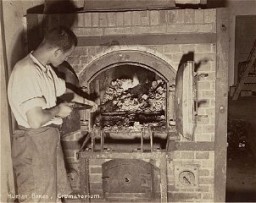
View of a section of the newly liberated Dachau concentration camp as seen through the barbed-wire fence. Dachau, Germany, May 1945.
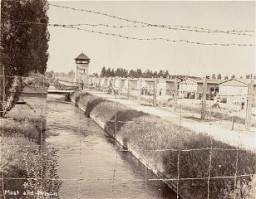
Corpses lie in one of the open railcars of the Dachau death train. The Dachau death train consisted of nearly forty cars containing the bodies of between two and three thousand prisoners transported to Dachau in the last days of the war. Dachau, Germany, April 29, 1945. This image is among the commonly reproduced and distributed, and often extremely graphic, images of liberation. These photographs provided powerful documentation of the crimes of the Nazi era.
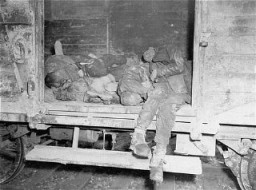
While on a tour of the newly liberated concentration camp, General Dwight Eisenhower and other high-ranking US Army officers view the bodies of prisoners who were killed during the evacuation of Ohrdruf. Ohrdruf, Germany April 12, 1945.
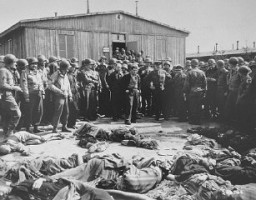
The bodies of former prisoners are piled in the crematorium mortuary in the newly liberated Dachau concentration camp. Dachau, Germany, April 29, 1945. This image is among the commonly reproduced and distributed, and often extremely graphic, images of liberation. These photographs provided powerful documentation of the crimes of the Nazi era.
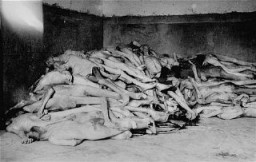
Corpses lie in one of the open railcars of the Dachau death train. The Dachau death train consisted of nearly forty cars containing the bodies of between two and three thousand prisoners transported to Dachau in the last days of the war. Dachau, Germany, April 29, 1945. This image is among the commonly reproduced and distributed, and often extremely graphic, images of liberation. These photographs provided powerful documentation of the crimes of the Nazi era.
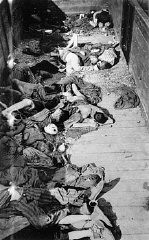
During an inspection by US Army chaplains of the newly liberated Buchenwald concentration camp, G. Bromley Oxnam (right) views a demonstration of how prisoners were tortured in Buchenwald. Oxnam was the Methodist bishop of New York and President of the Federated Council of Churches of Christ in America. Buchenwald, Germany, April 27, 1945.
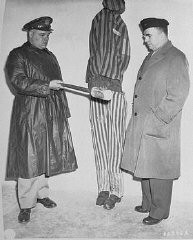
Survivors move around between rows of barracks in the newly liberated Dachau concentration camp. Dachau, Germany, May 1945. This image is among the commonly reproduced and distributed images of liberation. These photographs provided powerful documentation of the crimes of the Nazi era.
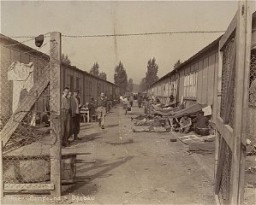
Survivors of the Dachau concentration camp demonstrate the operation of the crematorium by pushing a corpse into one of the ovens. Dachau, Germany, April 29–May 10, 1945. This image is among the commonly reproduced and distributed, and often extremely graphic, images of liberation. These photographs provided powerful documentation of the crimes of the Nazi era.
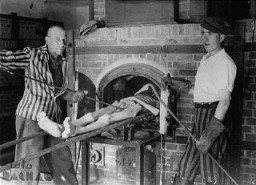
Survivors of the Dachau concentration camp demonstrate the operation of the crematorium by pushing a corpse into one of the ovens. Dachau, Germany, April 29–May 10, 1945. This image is among the commonly reproduced and distributed, and often extremely graphic, images of liberation. These photographs provided powerful documentation of the crimes of the Nazi era.
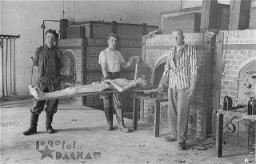
We would like to thank Crown Family Philanthropies, Abe and Ida Cooper Foundation, the Claims Conference, EVZ, and BMF for supporting the ongoing work to create content and resources for the Holocaust Encyclopedia. View the list of donor acknowledgement.